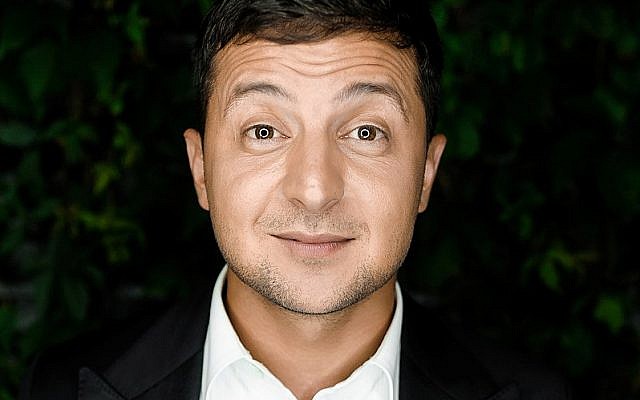Ukraine’s Jewish president likens his nation to Jewish people
President Volodymyr Zelensky eluded to Ukraine\s conflict with Russia as he drew parallels between his nation and the Jewish people
Amid renewed tensions between Russia and Ukraine, the leader of Ukraine drew parallels between his nation and the Jewish people at an event organised by Jews in Kyiv.
“We know what it’s like not to have an own state. We know what it means to defend one’s own state and land with weapons in hand, at the cost of our own lives,” President Volodymyr Zelensky, who is Jewish, said during a speech on Wednesday.
Zelensky, an actor and comedian who was elected president in 2019 thanks to many moderates who hoped he would deescalate the conflict with Russia, made the comments during the third annual Kyiv Jewish Forum, which is being organised by the Jewish Confederation of Ukraine, a communal body, with several partners.
“Both Ukrainians and Jews value freedom, and they work equally for the future of our states to become to our liking, and not the future which others want for us. Israel is often an example for Ukraine,” said Zelensky, who did not mention Russia explicitly in his speech at the event, which was held online due to the COVID-19 pandemic. The theme of this year’s conference was the 30th anniversary of the establishment of diplomatic relations between Ukraine and Israel.
In addition, Ukraine’s ambassador to Israel, Yevgen Korniychuk, told the Times of Israel that Ukraine may recognise Jerusalem as Israel’s capital — a goal Israel has been promoting intensively in recent years — pending some security-related conditions. Korniychuk did not specify those conditions and has not replied to questions on the matter from the Jewish Telegraphic Agency.
Haaretz quoted the ambassador as saying, “No foreign minister or ambassador can call Jerusalem anything but the capital of Israel.” However, there is little clarity on whether Korniychuk’s announcement constitutes an official recognition by Ukraine of Jerusalem as Israel’s capital. Last year, Zelensky said that Ukraine is considering opening a trade office in Jerusalem, which has not yet been opened. He also said that moving the embassy to Jerusalem is “currently not on the agenda.”
Security collaboration between Israel and Ukraine is a sensitive issue for the Jewish state because Israel has vested security interests in maintaining a constructive relationship with Russia, which is the most significant military power on the ground in Syria. Israel, which also has close ties with Ukraine, has attempted to remain neutral on the dispute in Eastern Europe.
Russia has amassed about 100,000 troops along its border with Ukraine, according to Western intelligence agencies, prompting concerns of renewed fighting there.
Ukraine and Russia have had a border dispute since 2014, when Russia annexed Crimea, an area internationally recognised as belonging to Ukraine. Russia is also facilitating the de-facto secession of two enclaves along the Russian-Ukrainian border, which are being held by pro-Russian rebels.
The conflict began with the overthrow of the government of former Ukrainian president Viktor Yanukovych, labeled by his critics as a corrupt Russian stooge. Russia reacted to the revolution, which intensified nationalist and anti-Russian sentiment in Ukraine, by invading Crimea and facilitating the secession of the two breakaway regions.
Russian President Vladimir Putin, who had justified the Russian invasion as an action meant to safeguard minorities, including Jews, from Ukrainian “fascists,” recently also referenced Israel in the context of his country’s conflict with Ukraine. Putin suggested during a televised interview earlier this year that Ukrainians and Russians are essentially the same people and should unite as Jews have in Israel.
Israeli President Isaac Herzog also attended the Kyiv forum, focusing his speech on the need to fight antisemitism.
“We can never become complacent when it comes to threats of violence or hateful assaults against our sisters and brothers or against any human being,” Herzog said. “We must also reiterate that this is not just a Jewish issue. If allowed to fester, antisemitism ultimately lurks into other forms of intolerance and hate. It poisons our society and damages us all.”
The resurgence of nationalist sentiment in Ukraine has strained Israel’s relations with that country, especially when it comes to the veneration by the Ukrainian state of people who fought alongside Nazi Germany in World War II. Widely seen as patriots fighting against Russian domination, individuals like Stepan Bandera and Roman Shukhevych are celebrated in Ukraine with statues and street names, with no mention of the complicity of their troops in the Holocaust and other atrocities.
The former Israeli ambassador to Ukraine, Joel Lion, levelled intense criticism at Ukrainian officials over this issue, saying repeatedly and publicly that their actions on Nazi collaborators were “shocking and immoral.” Last year, the Ukrainian foreign ministry responded when Gennady Nadolenko, head of Ukraine’s diplomatic mission in Tel Aviv, advised Jerusalem to stay out of “internal issues of Ukrainian politics,” labelling Israel’s protests about the issue “counterproductive.”

Thank you for helping to make Jewish News the leading source of news and opinion for the UK Jewish community. Today we're asking for your invaluable help to continue putting our community first in everything we do.
For as little as £5 a month you can help sustain the vital work we do in celebrating and standing up for Jewish life in Britain.
Jewish News holds our community together and keeps us connected. Like a synagogue, it’s where people turn to feel part of something bigger. It also proudly shows the rest of Britain the vibrancy and rich culture of modern Jewish life.
You can make a quick and easy one-off or monthly contribution of £5, £10, £20 or any other sum you’re comfortable with.
100% of your donation will help us continue celebrating our community, in all its dynamic diversity...
Engaging
Being a community platform means so much more than producing a newspaper and website. One of our proudest roles is media partnering with our invaluable charities to amplify the outstanding work they do to help us all.
Celebrating
There’s no shortage of oys in the world but Jewish News takes every opportunity to celebrate the joys too, through projects like Night of Heroes, 40 Under 40 and other compelling countdowns that make the community kvell with pride.
Pioneering
In the first collaboration between media outlets from different faiths, Jewish News worked with British Muslim TV and Church Times to produce a list of young activists leading the way on interfaith understanding.
Campaigning
Royal Mail issued a stamp honouring Holocaust hero Sir Nicholas Winton after a Jewish News campaign attracted more than 100,000 backers. Jewish Newsalso produces special editions of the paper highlighting pressing issues including mental health and Holocaust remembrance.
Easy access
In an age when news is readily accessible, Jewish News provides high-quality content free online and offline, removing any financial barriers to connecting people.
Voice of our community to wider society
The Jewish News team regularly appears on TV, radio and on the pages of the national press to comment on stories about the Jewish community. Easy access to the paper on the streets of London also means Jewish News provides an invaluable window into the community for the country at large.
We hope you agree all this is worth preserving.






















